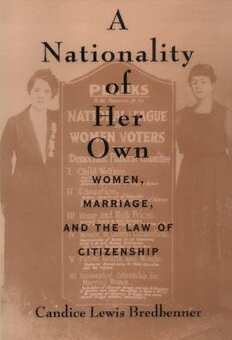
A Nationality of Her Own: Women, Marriage, and the Law of Citizenship PDF
204 Pages·1998·0.649 MB·English
Most books are stored in the elastic cloud where traffic is expensive. For this reason, we have a limit on daily download.
Preview A Nationality of Her Own: Women, Marriage, and the Law of Citizenship
Description:
In 1907, the federal government declared that any American woman marrying a foreigner had to assume the nationality of her husband, and thereby denationalized thousands of American women. This highly original study follows the dramatic variations in women's nationality rights, citizenship law, and immigration policy in the United States during the late Progressive and interwar years, placing the history and impact of "derivative citizenship" within the broad context of the women's suffrage movement. Making impressive use of primary sources, and utilizing original documents from many leading women's reform organizations, government agencies, Congressional hearings, and federal litigation involving women's naturalization and expatriation, Candice Bredbenner provides a refreshing contemporary feminist perspective on key historical, political, and legal debates relating to citizenship, nationality, political empowerment, and their implications for women's legal status in the United States. This fascinating and well-constructed account contributes profoundly to an important but little-understood aspect of the women's rights movement in twentieth-century America.
See more
The list of books you might like
Most books are stored in the elastic cloud where traffic is expensive. For this reason, we have a limit on daily download.
